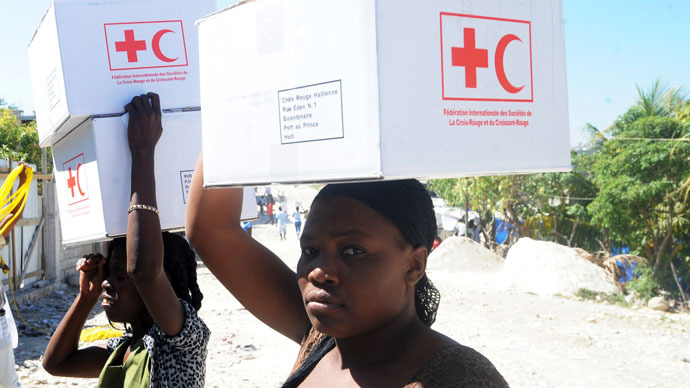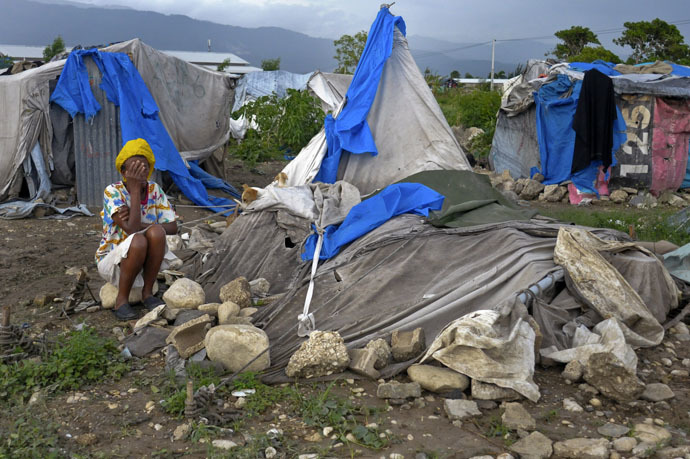‘Where’s the $500mn?’ Red Cross promises houses for 130,000 Haitians, ’builds only 6’

An investigation has found that the American Red Cross wasted $500 million in its bid to help Haiti, underperformed in its programs, and then tried to cover it up. Despite the NGO’s celebrated success, insider accounts point to failures.
When a devastating earthquake struck the Western hemisphere’s poorest country in 2010, the American Red Cross was one of the organizations at the forefront of the humanitarian effort to rebuild it a year later, launching a multi-million-dollar effort.
The main program – LAMIKA (a Creole acronym for ‘A Better Life in My Neighborhood’) – was to build hundreds of permanent homes to house some 130,000 people living in abject poverty after the quake.
Now, in 2015, the Port-au-Prince neighborhood of Campeche is as dilapidated as ever, with hardly any new buildings, trash strewn around, animals walking the streets, and people enduring sub-standard conditions in self-made shacks.
“Many residents live in shacks made of rusty sheet metal, without access to drinkable water, electricity or basic sanitation. When it rains, their homes flood and residents bail out mud and water,” an introduction to a report says.
An investigation by NPR and ProPublica gained access to “confidential memos, emails from worried top officers, and accounts of a dozen frustrated and disappointed insiders” familiar with how the NGO broke its promises, misspent millions of dollars, and then issued self-congratulatory progress statements.
The ensuing report reveals very different results to the ones outlined in CEO Gail McGovern’s project plan for Haiti, which promised “brand new communities” that would make “donors proud” and “help the people in Haiti.” She claimed her experience had made her more “flexible during emergencies.”

The investigation pointed to a series of systematic blunders and untruths surrounding the Haiti effort, however.
The Red Cross’s internal proposal put the number of houses to be built at 700 by January 2013. In reality, only six houses were actually constructed.
“We asked the Red Cross to show us around its projects in Haiti so we could see the results of its work. It declined,” the report reads.
Part of the reason behind the failure is that the Red Cross “didn’t have the know-how” and “they had no development experience,” former employees said.
In some cases, the NGO would give millions to other groups. Poor supervision and lack of proper oversight allowed these subcontractors to rack up inordinate bills for management and overhead costs.
Another issue that could have hindered the Red Cross’s work in Haiti is trouble with the country’s “dysfunctional” land title system.

Other groups, which the report does not name, had similar problems but, according to the data, “ultimately built 9,000 homes compared to the Red Cross’s six.”
Another possible reason for the dismal results, pointed out by current and former employees, was “an overreliance” on expats who could not speak French or Creole. The Red Cross’s statement, however, said that over 90 percent of people hired were Haitians. That didn’t seem to be reflected in the top positions, however, according to the authors of the report.
According to the report, the NGO displayed an arrogant attitude to national staff – some of the very few people who could speak French and the local Creole. In some cases, the Red Cross actively discouraged their participation. This led to poor communication with the local population and, ultimately, to the failure of the outreach project.
“Going to meetings with the community when you don’t speak the language is not productive,” one Haitian who worked on the project in Campeche said, adding that meetings would be skipped altogether at times.

Some $140,000 was spent on housing, food, and R&R for a foreign project manager, who also enjoyed four paid leaves a year. That comes to more than $100,000 more than would have been spent on a local equivalent.
“A lot of money was spent on those people who were not Haitian, who had nothing to do with Haiti. The money was just going back to the United States,” one Haitian who coordinated expat housing for the Red Cross confessed.
At the same time, Red Cross officials focused more on programs which would generate good publicity than those providing the most homes, according to testimony from Lee Malany, the project manager of the shelter program.
He recalled a Washington meeting where top officials had no idea what to do with the millions they’d been given for housing projects.
The organization would not provide details on how it spent the almost $500 million that it received, nor give specific details of how its projects were carried out. However, various promotional statements estimated that the initiative had repaired some 4,000 homes, erected temporary shelters for thousands of families, and donated $44 million for food aid and hospital construction.
“The Red Cross’s public reports offer only broad categories about where $488 million in donations has gone,” according to the authors of the report.

Five years since the quake, a report by McGovern says: “Millions of Haitians are safer, healthier, more resilient, and better prepared for future disasters thanks to generous donations to the American Red Cross.”
The organization claimed that it had helped 4.5 million Haitians, but according to reporters “there is reason to doubt” that.
Asked if there was any truth to the Red Cross’s claims, Haiti’s Prime Minister didn’t seem to know how the numbers could add up: “No, no… it’s not possible,” Jean-Max Bellerive said, stressing that the country’s entire population is only about 10 million.
“What the Red Cross told us is that they are coming here to change Campeche. Totally change it,” the report cites Jean Flaubert, the head of a community group set up by the Red Cross, as saying. “Now I do not understand the change that they are talking about. I think the Red Cross is working for themselves.”
The Red Cross had already been embroiled in several scandals following 9/11 and Hurricane Katrina relief efforts, but that did not matter to the many people, organizations and US celebrities who continued to support it.
The Haiti earthquake was touted as “a spectacular fundraising opportunity” within the organization, according to one former official involved with the program.
A great number of high-profile people and organizations donated to the cause, including Michelle Obama, many Hollywood A-listers, and the NFL.
It later turned out that the organization continued to collect funds for emergency relief projects even after it had hit its targets. The extra money was found to have been put toward eradicating the American Red Cross’s own debt, which exceeded $100 million.












